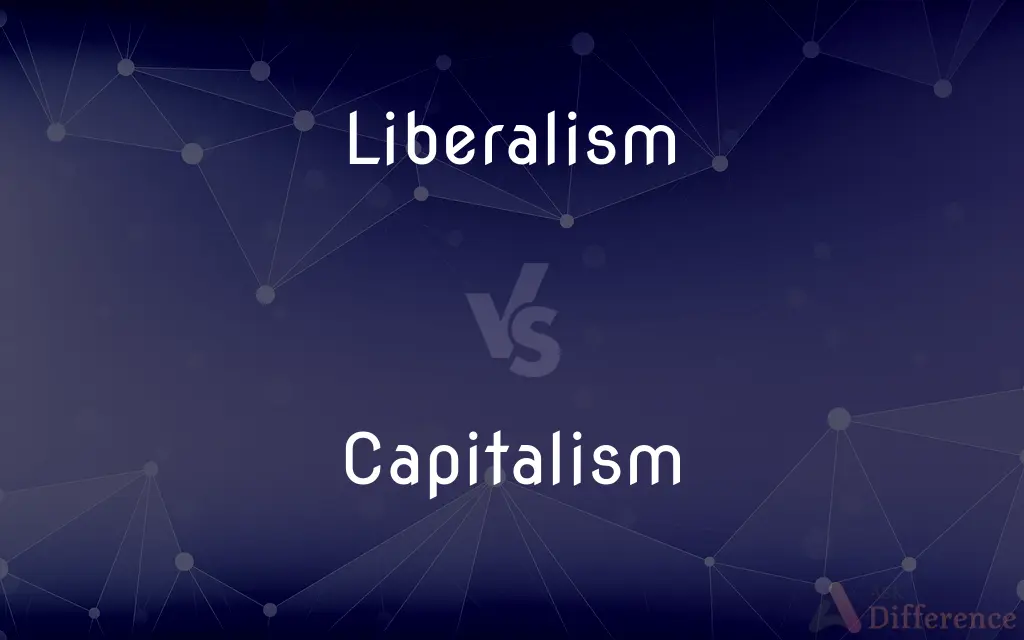Liberalism vs. Capitalism — What's the Difference?
By Tayyaba Rehman & Fiza Rafique — Updated on March 28, 2024
Liberalism is a political and moral philosophy emphasizing individual freedoms and equality, whereas capitalism is an economic system focused on private ownership and free markets.

Difference Between Liberalism and Capitalism
Table of Contents
ADVERTISEMENT
Key Differences
Liberalism, rooted in the Enlightenment, champions individual rights, democracy, and equality under the law. It advocates for freedoms such as speech, religion, and the press, seeing the government's role as a protector of these liberties. Capitalism, on the other hand, centers on the economic principles of private property, market freedom, and profit motivation. It operates on the belief that market forces, through competition, efficiently allocate resources.
While liberalism encompasses a broader ideological spectrum, including both social and economic dimensions, capitalism is strictly an economic model. Liberalism supports the idea of a free market but also emphasizes the need for government intervention to protect individual rights and to prevent abuses of power. Conversely, capitalism can exist under various political systems and does not inherently prioritize individual freedoms or equality, focusing instead on economic growth and efficiency.
The relationship between liberalism and capitalism can be complementary, as economic freedom under capitalism can enhance individual liberties. However, liberalism also critiques unregulated capitalism for creating economic inequalities and undermining democratic values. In contrast, capitalism emphasizes efficiency and innovation driven by competition, which can lead to disparities in wealth and power.
Liberal philosophies often advocate for social welfare policies to address the inequities produced by a capitalist economy, promoting a balance between market freedom and social justice. Capitalism, while it may drive economic growth and innovation, relies on minimal government intervention, potentially leading to social and economic disparities without liberal democratic checks.
Liberalism's principle of equality before the law suggests a role for the state in regulating economic activities to ensure fairness and protect against exploitation. Capitalism, emphasizing private ownership and individual profit, may resist such regulation, arguing that it stifles economic freedom and efficiency.
ADVERTISEMENT
Comparison Chart
Definition
A political and moral philosophy promoting individual freedoms, equality, and democracy.
An economic system based on private ownership of the means of production and their operation for profit.
Core Principles
Individual rights, equality under the law, government protection of freedoms.
Private property, free market, competition, profit motive.
Political/Economic
Political and moral ideology.
Economic system.
Government Role
Protective and regulatory, ensuring individual rights and fairness.
Limited, mainly to protect property rights and enforce contracts.
Critiques
May critique unregulated capitalism for creating inequality.
Critiqued for leading to economic disparities and not inherently ensuring individual liberties.
Compare with Definitions
Liberalism
It supports democratic governance and the rule of law.
Liberalism promotes free and fair elections and judicial independence.
Capitalism
Capitalism encourages innovation and economic growth.
Competitive markets drive technological advancements and efficiency.
Liberalism
Liberalism emphasizes the importance of individual freedoms and equal rights.
Liberal democracies advocate for freedom of speech and the press.
Capitalism
It relies on free markets and competition to allocate resources.
Prices in a capitalist economy are determined by supply and demand.
Liberalism
Liberalism advocates for a balance between government intervention and individual liberties.
It supports social welfare programs to reduce inequality.
Capitalism
Capitalism's success is often measured by economic indicators like GDP growth.
High GDP growth rates are seen as signs of a healthy capitalist economy.
Liberalism
Liberalism seeks to protect individuals from coercion, including by the state.
It champions civil liberties and personal freedoms against undue government control.
Capitalism
Capitalism is defined by the private ownership of the means of production.
Businesses in capitalist systems operate for profit with minimal government interference.
Liberalism
The ideology values diversity and pluralism.
Liberal societies protect minority rights and encourage multiculturalism.
Capitalism
The system can lead to significant disparities in wealth and power.
Critics argue capitalism exacerbates income inequality.
Liberalism
Liberalism is a political and moral philosophy based on liberty, consent of the governed and equality before the law. Liberals espouse a wide array of views depending on their understanding of these principles, but they generally support individual rights (including civil rights and human rights), democracy, secularism, freedom of speech, freedom of the press, freedom of religion and a market economy.
Capitalism
Capitalism is an economic system based on the private ownership of the means of production and their operation for profit. Central characteristics of capitalism include capital accumulation, competitive markets, a price system, private property and the recognition of property rights, voluntary exchange and wage labor.
Liberalism
The state or quality of being liberal.
Capitalism
An economic system in which the means of production and distribution are privately or corporately owned and development occurs through the accumulation and reinvestment of profits gained in a free market.
Liberalism
A political theory founded on the natural goodness of humans and the autonomy of the individual and favoring civil and political liberties, government by law with the consent of the governed, and protection from arbitrary authority.
Capitalism
(politics) A socio-economic system based on private ownership of resources or capital.
Liberalism
Often Liberalism The tenets or policies of a Liberal party.
Capitalism
(economics) An economic system based on private ownership of the means of production and their operation for profit.
Liberalism
An economic theory in favor of laissez-faire, the free market, and the gold standard.
Capitalism
A socio-economic system based on private property rights, including the private ownership of resources or capital, with economic decisions made largely through the operation of a market unregulated by the state.
Liberalism
A 19th-century Protestant movement that favored free intellectual inquiry, stressed the ethical and humanitarian content of Christianity, and de-emphasized dogmatic theology.
Capitalism
An economic system based on the abstraction of resources into the form of privately owned capital, with economic decisions made largely through the operation of a market unregulated by the state.
Liberalism
A 19th-century Roman Catholic movement that favored political democracy and ecclesiastical reform but was theologically orthodox.
Capitalism
An economic system based on predominantly private (individual or corporate) investment in and ownership of the means of production, distribution, and exchange of goods and wealth; contrasted with socialism or especially communism, in which the state has the predominant role in the economy.
Liberalism
The quality of being liberal.
Capitalism
An economic system based on private ownership of capital
Liberalism
(politics) Any political movement founded on the autonomy and personal freedom of the individual, progress and reform, and government by law with the consent of the governed.
Liberalism
(economics) An economic ideology in favour of laissez faire and the free market (related to economic liberalism).
Liberalism
Liberal principles; the principles and methods of the liberals in politics or religion; specifically, the principles of the Liberal party.
Liberalism
A political orientation that favors progress and reform
Liberalism
An economic theory advocating free competition and a self-regulating market and the gold standard
Common Curiosities
Why do some liberals critique capitalism?
Some liberals critique capitalism for creating economic inequality and undermining the social fabric that is necessary for a cohesive and fair society.
Is government intervention more prominent in liberalism or capitalism?
Government intervention is more prominent in liberalism, which advocates for regulatory measures to protect individual rights and promote equality, unlike capitalism, which favors minimal government interference in the economy.
What is the main difference between liberalism and capitalism?
Liberalism is a broad political and moral ideology emphasizing individual rights and equality, while capitalism is an economic system focused on private ownership and free markets.
How does capitalism affect individual freedoms?
While capitalism promotes economic freedom, it does not inherently ensure individual liberties or equality, sometimes leading to disparities that can affect democratic values.
How do liberalism and capitalism address social welfare?
Liberalism often advocates for social welfare programs to address inequalities, whereas capitalism focuses on economic growth and may neglect social welfare without regulatory policies.
What role does competition play in capitalism?
Competition is a cornerstone of capitalism, believed to drive efficiency, innovation, and economic growth by naturally regulating the market.
Can liberalism and capitalism coexist?
Yes, they can coexist and often do; liberalism supports the idea of a free market but also stresses the need for government intervention to protect individual rights and ensure fairness.
Can a capitalist economy operate without democratic principles?
Yes, a capitalist economy can operate under various political systems, including non-democratic ones, as its primary concern is economic, not political or moral principles.
Do liberalism and capitalism prioritize the same values?
While they share some values like the importance of individual agency, their priorities differ, with liberalism focusing on rights and equality, and capitalism on economic freedom and efficiency.
How do liberalism and capitalism view the role of the state in economic affairs?
Liberalism sees the state as a protector of individual rights and a regulator to ensure fairness, while capitalism views the state's role as limited to protecting property rights and maintaining a free market.
Share Your Discovery

Previous Comparison
Sorbent vs. Adsorbent
Next Comparison
Streetcar vs. TrolleyAuthor Spotlight
Written by
Tayyaba RehmanTayyaba Rehman is a distinguished writer, currently serving as a primary contributor to askdifference.com. As a researcher in semantics and etymology, Tayyaba's passion for the complexity of languages and their distinctions has found a perfect home on the platform. Tayyaba delves into the intricacies of language, distinguishing between commonly confused words and phrases, thereby providing clarity for readers worldwide.
Co-written by
Fiza RafiqueFiza Rafique is a skilled content writer at AskDifference.com, where she meticulously refines and enhances written pieces. Drawing from her vast editorial expertise, Fiza ensures clarity, accuracy, and precision in every article. Passionate about language, she continually seeks to elevate the quality of content for readers worldwide.














































